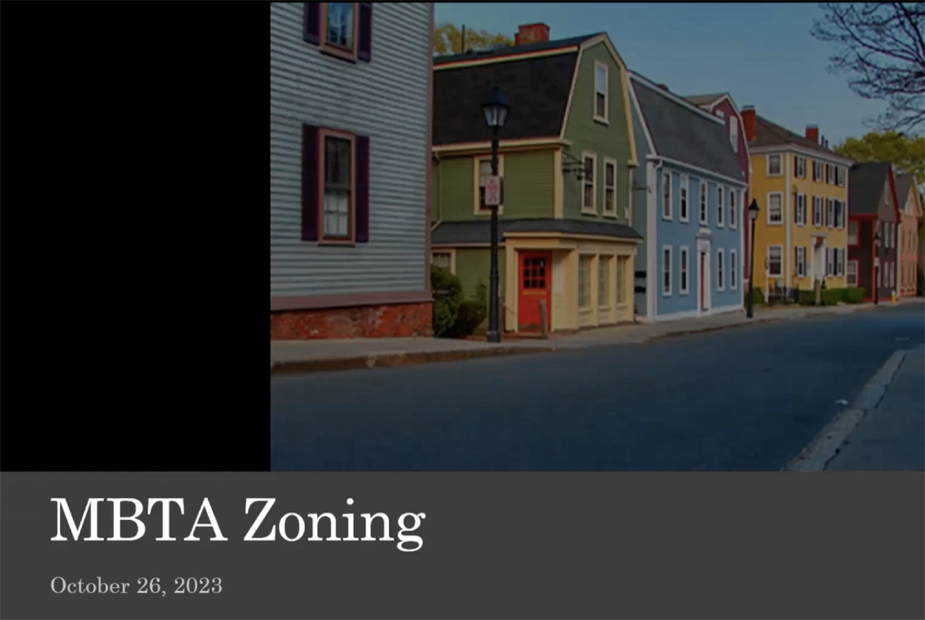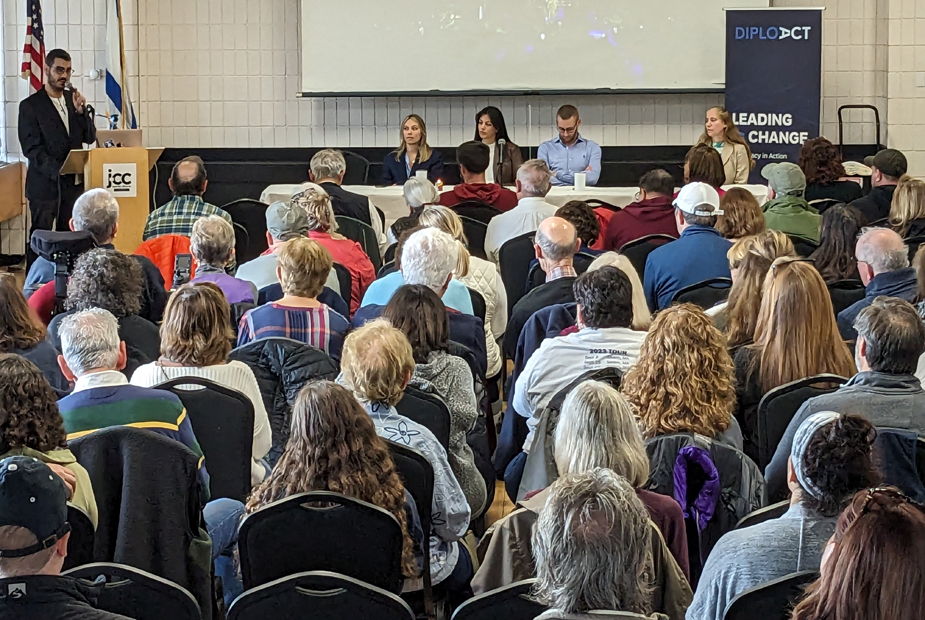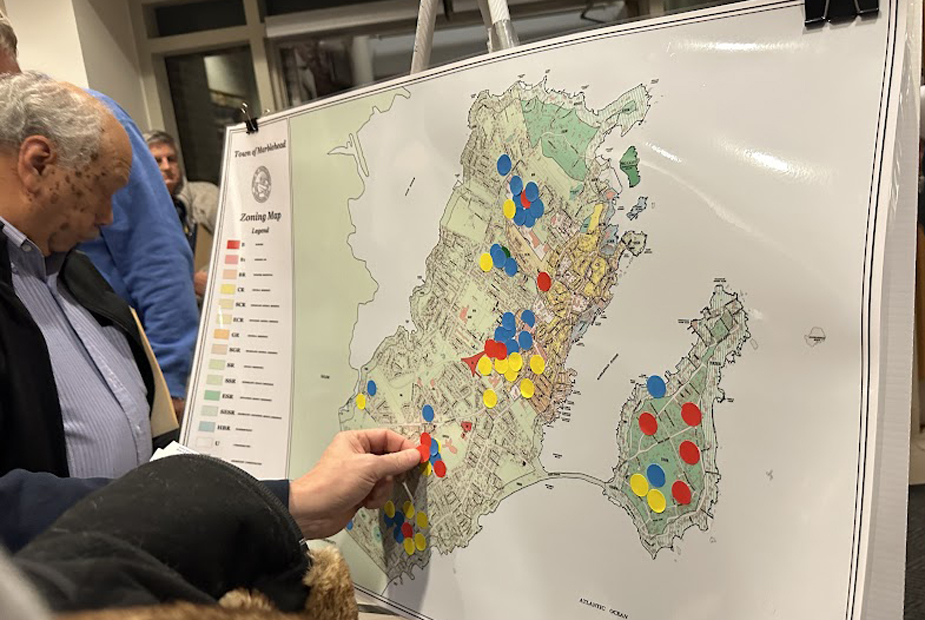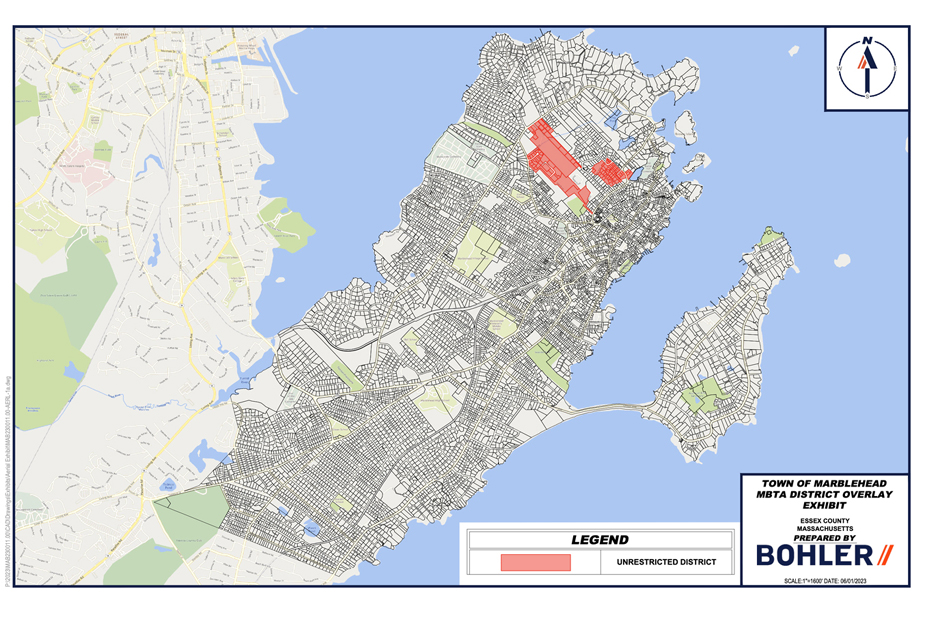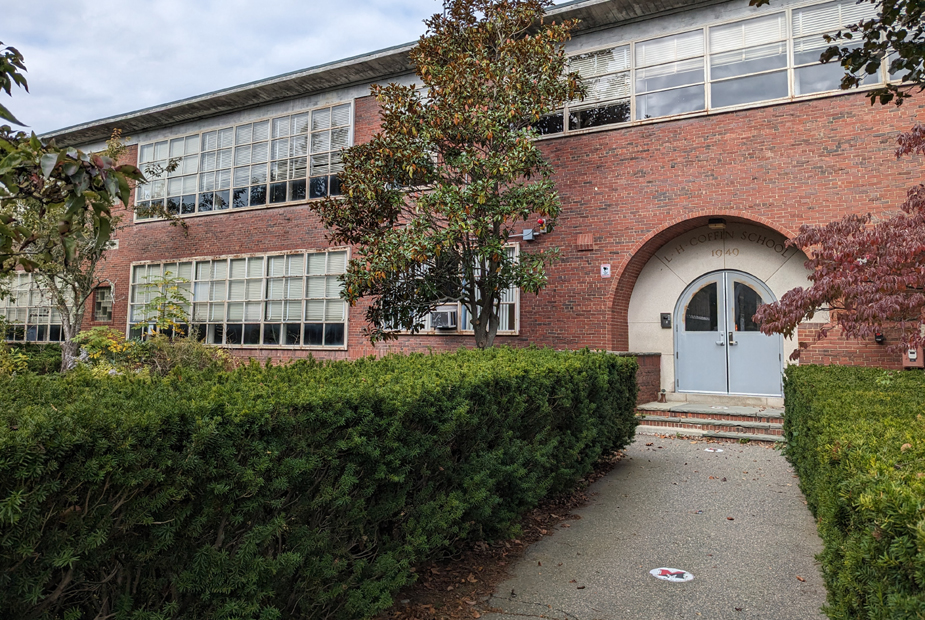Planning Board Gathers Public Input on Implementation of Multi-Family Zoning Legislation
More than 175 individuals virtually attended a Zoom meeting held by Marblehead’s Planning Board on October 26, 2023. The meeting was the first of several the Planning Board is hosting in an effort to get input from town residents about the implementation of the MBTA Communities Zoning Law in Marblehead. Town Planner Becky Cutting ran a Power Point presentation during the meeting.
Earlier this month Marblehead Beacon published an article outlining the various potential implications for Marblehead of the zoning-related state legislation. The law requires that Marblehead—and 176 other municipalities across Massachusetts—implement zoning changes that allow for significant increases in multi-family units. In the case of Marblehead, the changes require that a minimum of 897 units be permitted to be built “as of right,” which is defined as “development that may proceed under a zoning ordinance or by-law without the need for a special permit, variance, zoning amendment, waiver, or other discretionary zoning approval.”
In earlier interpretations of the law, the multi-family housing envisioned for Marblehead was required to be within a half mile of public transit, but that was changed by the state more than a year ago. Now, Marblehead is designated an “adjacent community” to Swampscott and Salem—two municipalities with MBTA transportation—and only needs to consider the number of units (a minimum of 897) and the number of acres utilized (a minimum of 27 in at least five-acre increments).
State threatens municipalities that do not comply
Initially, any municipality opting not to change its zoning under the new legislation would have faced losing out on several limited and specific state funding sources. Following the change in administrations from Charlie Baker to Maura Healey, however, the threat of funding losses connected to a municipality’s failure to comply has grown. Additionally, in recent months, Attorney General Andrea Campbell has put out advisories that threaten legal exposure for any city or town that fails to follow the far-reaching zoning law. “MBTA Communities that fail to comply with the Law’s requirements also risk liability under federal and state fair housing laws,” her March 2023 advisory reads, and goes on to say, “The Massachusetts Antidiscrimination Law and federal Fair Housing Act prohibit towns and cities from using their zoning power for a discriminatory purpose or with discriminatory effect. An MBTA Community may violate these laws if, for example, its zoning restrictions have the effect of unfairly limiting housing opportunities for families with children, individuals who receive housing subsidies, people of color, people with disabilities, or other protected groups.”
Marblehead Beacon reached out to both AG Campbell and the Executive Office of Housing and Livable Communities 3A team for clarification on precisely what would be at stake both dollars-wise and legally were Marblehead to opt out of the zoning legislation. We will update as any responses come in.
Timeline for town residents’ input and zoning bylaw compliance
In order for the Town of Marblehead to be in compliance with the new legislation, voters will have to authorize the zoning changes in next May’s warrant at Town Meeting. Though Campbell’s threats leave little room for interpretation about the expectation of compliance, it remains unclear what will happen consequence-wise should Marblehead town officials present proposed bylaw changes to voters, but voters reject such changes.
Cutting and Planning Board Chair Bob Schaeffner noted in last night’s presentation that the meeting was only the first step in determining exactly what will be presented to voters in May. The deadline for compliance with the state law, according to Cutting, is December 2024, but from what she stated in last night’s meeting, the matter is slated to be settled earlier. After all input is solicited and received from town residents, Cutting said, the language will be put forth in January 2024 and then presented to Town Meeting in May.
In order to meet the compliance deadline, the Planning Board will be listening to town residents at upcoming meetings to “analyze and identify” the appropriate areas of town to designate for the “as-of-right zoning” areas. Community engagement, she said, will be key to making the decision. To that end, last night’s meeting will be followed by an in-person gathering on the evening of November 2nd at a to-be-determined location, and will include break-out sessions. And following next week’s meeting, said Cutting, there will be additional opportunities for the public to engage with the Planning Board and register concerns and opinions.
Though nothing has yet been finalized, there was also a brief discussion last night about the prospect of creating a task force.
In light of the large presence at last night’s Zoom meeting, the initially proposed Abbot Hall location for November 2nd’s in-person gathering was scrapped. Instead, Cutting will seek a location that will accommodate a crowd that could number in the hundreds, and that will offer adequate parking. Among locations being considered is Marblehead High School.
Town residents present myriad questions
Many dozens of questions appeared in the “chat” box on the Zoom platform last night. Participants were limited to communicating via chat and were not allowed to participate verbally. Cutting went through each question individually, and for those she was unable to address immediately, she promised she would circle back in the future with answers.
Increased traffic and schooling needs with new families
Among the concerns registered by those virtually attending was whether there would be negative impacts on traffic were some 900 new units to be built. Addressing these concerns, as well as similar ones pertaining to the inevitable increase in necessary town services—including schooling for a potentially sizable influx of children—Cutting reminded attendees that the legislation is for zoning, not building. Members of the Planning Board pointed out that other zoning options existed for many years before anyone availed themselves of the opportunity to build.
While only a zoning law, state expects to see creation of multi-family units
Unlike existing zoning options, the new “as of right” mandate—if implemented in Marblehead—could make converting existing property to dense multi-family dwellings fairly easy for developers and owners. Given that the very rationale for the law is to do precisely that, it is foreseeable that hundreds of multi-family units indeed could pop up over a relatively short period of time.
Attorney General Campbell has been quite clear in defining the thinking behind the legislation. “The Law was enacted to address the Commonwealth’s acute need for housing by facilitating the development of transit-oriented, multifamily housing,” she said in a March 2023 advisory. “By any measure, Massachusetts is in a housing crisis that is inflicting unacceptable economic, social, and environmental harms across our state – particularly on working families and people of color. The Law directly responds to this crisis by implementing zoning reforms that require MBTA Communities to permit reasonable levels of multifamily housing development near transit stations.”
In spite of the fact that the legislation’s mandate is for multi-family zoning only and does not require that towns or homeowners actually build multi-family units, the “spirit of the law” was something that came up both last night and at a prior Planning Board meeting. Cutting said, for instance, that it would make sense for the location of the multi-family districts to be near the bus route. The “spirit is to have it near transit so to put it near the bus route makes sense.”
More revenue or more costs with hundreds of new units?
At one point Cutting noted that there would be a financial upside to the town having more taxable residences, but attendees questioned whether the costs associated with providing town services to new families would cost more than any revenue generated. It was not always evident who was speaking due to the format of the video meeting, but at one point a Planning Board member stated that he anticipated costs to the town rising, “given the demographic that moves to town, being that there are children and the cost of education in Marblehead.” Cutting said she would look into this matter.
Which areas of town should be selected?
Another concern raised by attendees was that the area considered by Bohler—the state-funded engineering firm Marblehead is using to develop its plans—was very limited and did not include other possibly viable areas in town. Cutting reinforced that the town tasked Bohler with looking at already-existing unrestricted districts—areas in town in which multi-family homes are already allowed, but must go through a permitting process distinct from the “as of right” ones imagined by the new legislation. Bohler was charged, Cutting said, with assessing those districts for possible dual compliance with the new legislation. The answer to that proposition was “no,” she said, and therefore Bohler proposed what it deemed a logical way to comply using an expanded area that included—in part—those areas and others. But Cutting acknowledged that ultimately it will be up to the will of town residents to select the area(s)—virtually anywhere in Marblehead—that will be proposed in the town warrant next year.
Historic Marblehead: off limits?
While most areas of town are—in theory—fair game, Cutting noted that initially the area of historic Marblehead was not considered because to do so would alter its character and it is one of the most important historical areas in the country. That said, though, she acknowledged that the decision would be up to residents.
If the zoning changes ultimately are approved at Town Meeting, developers or existing property owners would be entitled to build multi-family homes by right. The “as of right” consideration, however, pointed out Cutting, would not mean that such homes could be built without any restrictions. Site-plan review criteria regarding things such as height, setback, and other typical zoning considerations would still be at play.
Affordable housing
Regarding affordable housing—which came up more than once in the chat function of the Zoom—Cutting noted that additional units would result in “naturally occurring affordable housing.” Such housing, it was noted, arises from more supply and therefore an assumption of less demand. While certain configurations—such as 40R Smart Growth areas—could require legally defined affordable housing, the new legislation itself does not mandate it.
The next Planning Board meeting on the topic of Marblehead’s implementation of the MBTA communities law will be held in person, and will take place on the evening of November 2, 2023. The location is to be determined.

